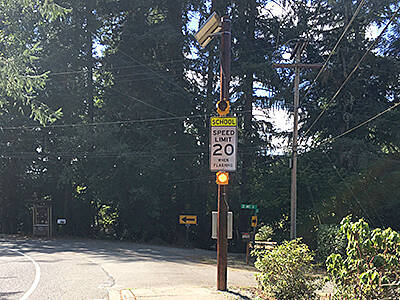In Auburn’s school zones over the last decade, almost 100 close calls and minor accidents with pedestrians had occured, the school district reports.
Across the state, in the last eight years, two students on foot lost their lives in collisions with motor vehicles. And data shows the difference between 20 mph and 30 mph in most cases is the difference between a fatality and a survivable accident, said Dr. Alan Spicciati, Superintendent of the Auburn School District, at the Auburn School Board’s regular meeting March 28.
“Quite honestly, it’s frightening,” said Spicciati in his update to the board about the installation of speed cameras in school zones this fall.
This past February, the Auburn City Council unanimously passed a resolution allowing Mayor Nancy Backus to enter into an agreement with Arizona-based Verra Mobility, which provides automated traffic safety cameras.
“Nobody likes getting a ticket, but this is truly going to be preventative, and if the city didn’t get any tickets, we’d be really happy,” Spicciati told the board. “The plan we intend is to change behavior to keep students safe. Cameras will go in this fall, there will be 12 locations based on a traffic study of the areas that have the highest volume and the most speeding. They can be moved over time if things get better other areas.”
Speed cameras will be installed in school zones that currently have the flashing light beacons, city engineer Jacob Sweeting said at the Feb. 14 council meeting. Speeding in a school zone carries a fine of $200, according to the city code. The speed limit in school zones is 20 mph.
Spicciati emphasized that the school district will not receive any resources from those cameras.
“It’s not a money maker for the city either. It pays for the cameras and any additional money goes to traffic calming throughout the city, so it’s really just a safety issue,” Spicciati said.
The city anticipates there will be more than enough citations each month to pay for the cameras. The city conducted a preliminary study of school zones over a two-day period and recorded over 5,000 vehicles speeding in the school zones while the beacons were flashing.
At $200 a ticket, each camera would only have to issue 20 tickets per month in order to start generating revenue for the city.



